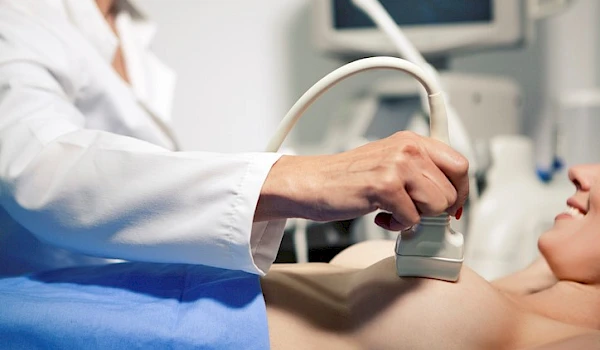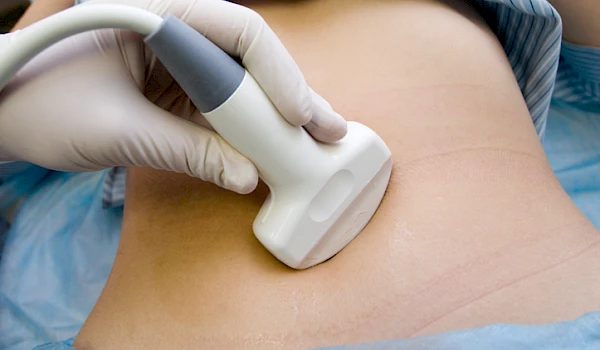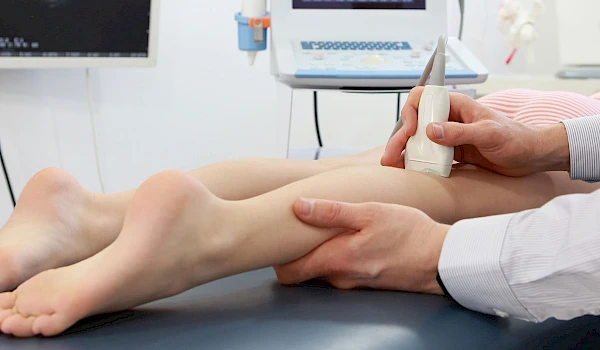What is an ultrasound scan?
An ultrasound scan is a fast, easy to perform, painless method of soft tissue analysis with no known side effects. The medical equipment produces a vibration wave in the ultrasound range, which is reflected back from different tissues in different ways. Using the returning ultrasound waves, it is able to isolate tissues with different structures and produce highly accurate two- or three-dimensional images. Ultrasound is a range of sound waves that cannot be detected by the human ear. Ultrasound imaging is of great importance in medical diagnostics because it is a fast, easy to perform and accessible, even portable, method of examining soft tissue. The sound waves reflect the ultrasound from the surface of the bones and air spaces, so the internal structure of these cannot be assessed, but it is an excellent diagnostic tool for different stones, for example. As it has no harmful side effects and can be repeated indefinitely, it is an excellent screening tool. At Margit Medical Center, ultrasound scans are available as a private consultation.
When is it advisable to have an ultrasound scan?
Ultrasound scans are an excellent tool for early detection of diseases. It helps in early diagnosis. Ultrasound scans are an excellent preventive screening test, so certain ultrasound scans should be done regularly, even annually, for screening purposes, such as breast ultrasound, prostate, vaginal, pelvic and cardiac ultrasound. The advantage of ultrasound is that it provides a quick and accurate picture of the soft tissues of the body, so that some benign and malignant lesions can be accurately detected.
What is the procedure?
The scan is usually performed in the supine position, with the patient exposing the part of the body to be scanned, as the skin surface needs to be coated with a gel to help the sound wave propagate, so that the little air between the scanning head and the skin does not reflect the sound wave. For different examinations, the organs can be viewed from different directions on the surface by moving the probe head, whether in motion, in deep inhalation or under pressure.
The examining doctor can capture the image produced by the equipment, record it digitally or print it out, or even record it on video. Measurements can be taken from the images afterwards and the machine can also perform various calculations.
After the scan, the ultrasound gel can be wiped off, leaving no trace on the skin or clothing.
How to prepare for an ultrasound scan?
An ultrasound scan is a completely painless procedure, so no special preparation is required. For pelvic ultrasound, it is important to hold back urine for 1-2 hours before the scan, or arrive on an empty stomach for abdominal ultrasound. Avoid drinking carbonated soft drinks before the UH scan. No other preparations are necessary before the examination.
What ultrasound scans are available?
The following ultrasound examinations are available at Margit Medical Centre:
- Abdominal ultrasound: abdominal ultrasound can be used to check the condition of the liver, bile ducts, gall bladder, pancreas, spleen, kidneys and to a lesser extent the intestinal tract and abdominal blood vessels.
- Pelvic ultrasound: This is mainly used to assess the bladder and genital organs, the prostate and uterus, and the ovaries.
- Cervical ultrasound: This examination of the cervical region can be used to assess the structure, location and lesions of the salivary glands, thyroid gland, cervical lymph nodes and any abnormalities that have developed in the cervical region.
- Breast ultrasound: examination of the lymph nodes in the breasts and armpits. It can be used to check for lumps in the breast and for any problems with implants.
- Lower limb venous ultrasound: excellent for visualising and monitoring the structure of the walls of blood vessels, narrowing and any disturbances in flow.
- Cardiac ultrasound: a cardiac ultrasound scan that examines the size of the heart cavity, the fluid accumulated in the pericardium, and the activity of the valves that regulate blood flow.
- Renal ultrasound: This is used to examine the shape, size and glandular composition of the kidneys. We also examine the renal cavity system and the renal vessels.
- Carotid ultrasound: The Color-Doppler technique is used to assess the condition of the carotid arteries, to detect vasoconstriction and vascular calcifications.
- Penile ultrasound: This scan can detect injuries, palpable abnormalities, inflammatory lesions and venous blockages.
- Testicular ultrasound: Can be used to examine the testicular tissue structure, the arteries and veins around the testicles.
- Rectal prostate ultrasound: This can be used to determine inflammation, prostate enlargement, the size and structure of the organ.
- Soft tissue ultrasound: palpable lumps, muscle lesions, haemorrhages can be examined with ultrasound.
- Thyroid ultrasound (including lymph nodes): Can be used to detect thyroid diseases and thyroid dysfunction.
Does the test have side effects, is the test risky?
The ultrasound scan does not involve any radiation exposure, so there are no adverse effects on the body. It has no side effects and is completely painless, so it can be repeated as many times as you like. There is no instrumental intervention during the scan. The scan does not cause any tissue damage and can be used at any age. It is also excellent for use in pregnancy and in young children or infants.
How long does the test take?
On average an ultrasound scan takes 15-20 minutes, depending on the area to be examined. During the scan the specialist will assess your symptoms and answer any questions you may have. Based on the UH scan, a diagnosis is made or further tests are ordered if necessary.
Why Margit Medical Center?
- modern equipment
- reliable, accurate results
- highly qualified specialists
- long opening hours
- ultrasound scans in private practice
- same day ultrasound appointment, no long waiting time
- no need for referral
If you have any other questions about ultrasound scans, please do not hesitate to contact us.
Related prices
| Name | Price |
|---|---|
| Abdominal pelvis (male / female) ultrasound examination | 30 000 HUF |
| Abdominal pelvis (male / female) ultrasound examination + retention measurement | 35 000 HUF |
| Retention measurement (male / female) | 28 000 HUF |
| Pelvic ultrasound examination in men | 30 000 HUF |
| Thyroid (including lymph nodes) UH examination | 30 000 HUF |
| Breast + armpit ultrasound examination | 33 000 HUF |
| Carotid ultrasound examination (2 vessels) | 30 000 HUF |
| Lower extremity venous ultrasound examination (per piece) | 30 000 HUF |
| Penis ultrasound examination | 28 000 HUF |
| Testicles US test | 30 000 HUF |
| Rectal prostate ultrasound examination | 33 600 HUF |
| Heart ultrasound examination | 46 800 HUF |
| Soft tissue ultrasound examination | 28 000 HUF |
| Kidney ultrasound examination | 30 000 HUF |
| Neck ultrasound examination | 30 000 HUF |
Register at +36 1 998 0000
Prices are for current examinations only.
Prices listed above are given for information purposes only. Our prices are in HUF, gross prices.
You can pay in our institution in cash or by credit card.



